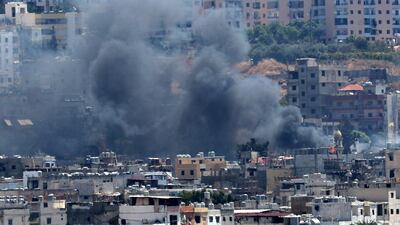A ceasefire in Lebanon’s largest Palestinian refugee camp broke down on Monday as militants and the camp’s security forces clashed for a fifth day in battles that have left at least four dead.
Heavy weapons including mortar rounds have been used in the battle, with stray munitions causing damage in neighbourhoods adjacent to the camp.
It is likely that hundreds of Ain Al Hilweh's residents have fled their homes amid the fighting, but the exact number is difficult to estimate since most have gone to stay in private homes outside the camp, said Ziad Abu Al Ainien, a doctor from the Palestinian Red Crescent, and camp officials. Off-and-on ceasefires have also made the numbers displaced difficult to guage.
"Because of the ceasefire yesterday (Sunday), some people went back," said Mr Abu Al Ainien.
As part of a decades-old agreement, the Lebanese government’s forces do not enter any of the country’s 12 Palestinian camps, though the army maintains checkpoints at all entrances to Ain Al Hilweh, where as many as 100,000 people live.
The fighting started on Thursday when fighters loyal to Bilal Badr, a radical militant wanted by the Lebanese government, attacked an office of the camp's government-recognised joint security force near where Badr was believed to be in hiding. Fighting ebbed on Friday before intensifying again on Saturday. A ceasefire was agreed to on Sunday, but had fallen apart by Monday morning.
“These fundamentalist groups have been trying to occupy our offices since Saturday,” said Bassam Al Saad, the head of the joint security force. “Today we are not attacking, we are just trying to defend our places, but if they continue attacking us we will have to eliminate them, and we will not stop until we finish them.”
Although the force, a coalition of Palestinian groups dominated by Fatah and the PLO, is frequently called on to engage militant groups who use the camp as a haven, the latest fighting has caused a rift in its ranks. On Saturday, Hamas withdrew from the group in protest against what it considered a unilateral decision by Fatah to capture Badr.
This is at least the third time this year that clashes have taken place between the joint security forces and militants loyal to Badr in the camp. In April, the Lebanese army threatened to enter Ain Al Hilweh after a week of clashes between the same groups left 10 people dead before the joint security force re-established its control.
Read more: Fierce clashes rock Palestinian camp in Lebanon
Some camp residents said the reason the joint security force had been unable to bring Badr to heel thus far was the fear that other Islamist factions might come to his aid.
“There are meetings now between the PLO and Islamist groups that are not fighting, and we are trying to reach another ceasefire,” Mr Al Saad said.Camp residents who fled the current fighting said they feared it would not end soon.
“Yesterday I went to my house during the ceasefire to get clothes for my children,” said Umm Zahra, who lives in Al Tiri, a neighbourhood in Ain Al Hilweh at the centre of the clashes. “I saw the fighters, but most of the families had fled.”
Umm Zahra, as did most of the other Palestinians who spoke to The National on Monday, asked that her full name be withheld. She and her daughter had taken refuge at a mosque near one of the camp entrances with nine other families.
“In April, we were here for 10 days,” said Abu Mohammed, a father of eight who was also at the mosque. “We are fed up from all the groups. The Islamists and Fatah and the PLO. They should take responsibility for rebuilding houses that are damaged in the fighting. Instead, they just fight and then forget about it.”
“April’s clashes were the worst in years. The destruction was exceptional,” said Abu Wael Zeaiter, a camp leader who was helping to mediate a halt to the current round of violence. “For the first time, two sides were determined to eliminate one another.”
Mr Zeaiter said a coalition of NGOs had planned this week to start rebuilding or repairing homes and shops destroyed or damaged in the April fighting, making the timing of the current clashes particularly unfortunate.
The fighting that continued on Monday was not the only incidence of violence in Ain Al Hilweh in the past week. Unknown gunmen shot at workers building a controversial wall around the camp last Wednesday. The wall, which was begun last year, stands about five metres tall and will encircle the entire camp. It is nearly complete after construction was briefly halted in November when camp residents protested.
Ain Al Hilweh “is like a prison”, said Abu Ibrahim, a camp leader who often serves as an interlocutor between residents and the Lebanese army.
“Palestinians [in Lebanon] are deprived of work and civil rights, and that produces terrorists. Instead of helping, the government are our jailers.”

